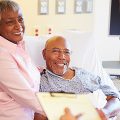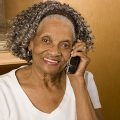
By Barry J. Jacobs
Fred’s argument with his 85-year-old mother, Sarah, about her safety and security was always the same — and he always lost. He lived two states away and wanted her to move from her three-story home of 50 years to a one-floor senior apartment near him where she’d be less likely to get hurt from a fall. In their weekly calls, he insisted she needed to accept this inevitable change.
But Sarah stoutly resisted, arguing that her close-at-hand neighbors were providing her with all she needed to stay in the home she loved. The young family next door frequently paid her visits and brought her a dinner plate. The volunteers at the fire department down the block helped with repairs in return for Sarah’s pound cake. Her church group stopped by every Sunday afternoon for gossip and tea.
At a time when many families are dispersed around the country and family get-togethers occur more often on FaceTime than at kitchen tables, it’s neighbors who sometimes step up to help an aging parent day-to-day. They pick up groceries and medications on a regular basis. They shovel snow and cut grass without even having to be asked.
They check on older adults during heat waves, cold snaps and bad storms. Their commitment isn’t as deep or long-standing as that based on blood relation. But their kindness can make them integral members of informal caregiving teams.
It’s the informality of the arrangement that sometimes concerns long-distance caregivers, however. Are the neighbors trustworthy and reliable? Will they really be there and know what to do in the event of an emergency? It’s one thing to pick up a gallon of milk or even lift someone who’s fallen; it’s another to sit in the ER for four hours. And what if they move away long before then? Or get caught up in their own problems and then become unavailable?
But family caregiving has never been strictly a family matter. We live in social environments surrounded by social support. If family caregivers like Fred devote time to engaging their aging parents’ most natural social networks — friends and neighbors — then they may be able to coordinate efforts with them. Care receivers like Sarah are not likely to balk at that. How can family caregivers achieve this goal? Here are some ideas:
Meet the “starting five.” You may already know which acquaintances your parent turns to for help, or you can directly ask by using a basketball analogy to inquire about her “starting five” — that is, the five people upon whom she normally most relies.
You and other family members may be on that all-star list, but so may an across-the-street neighbor, the middle-schooler who walks her dog, a dear friend or the funny Meals on Wheels delivery man. As with any basketball team, all of you may have distinct roles. But unlike in basketball, the members may scarcely be aware of each other’s existence as the top players of Team Sarah.
Make a point of meeting individually with the starting five the next time you visit with your parent. Offer your thanks for all they’ve done and make sure they are comfortable continuing to play this role. Explain that they are valued members of a team that helps your parent to live as well as possible but that the team needs a strategy and plays.
Get their permission for you to regularly confer with them about how your parent seems to be coping. Then shower them with gratitude and maybe the occasional formal thank-you note. The team will be better coordinated and effective over time, especially important if the parent’s level of functioning declines
Seek community exchange forums. More American communities and religious congregations are setting up time banks or other forums in which neighbors can barter services with other neighbors. For example, you may clear branches from my mom’s front lawn today; I then agree to drive your mom to her medical appointment tomorrow.
This straightforward trade (with no money involved) of simple essentials can be the difference between an older adult aging in place or departing. It also encourages those who are reluctant to take handouts to participate in a give-and-take.
Call the local Area Agency on Aging (which you can find using the federal government’s Eldercare Locator) to find out whether your parent’s community has such an exchange forum.
Don’t dwell on the thickness of blood. Never resent the involvement of the family next door. It is rarely a replacement for the real family but can be helpful eyes, ears and arms on the ground. It extends your reach and helps your loved one live fully as she wants.
Barry J. Jacobs, a clinical psychologist, family therapist and healthcare consultant, is the author of “AARP Meditations for Caregivers” (Da Capo, 2016).

















Leave a Comment